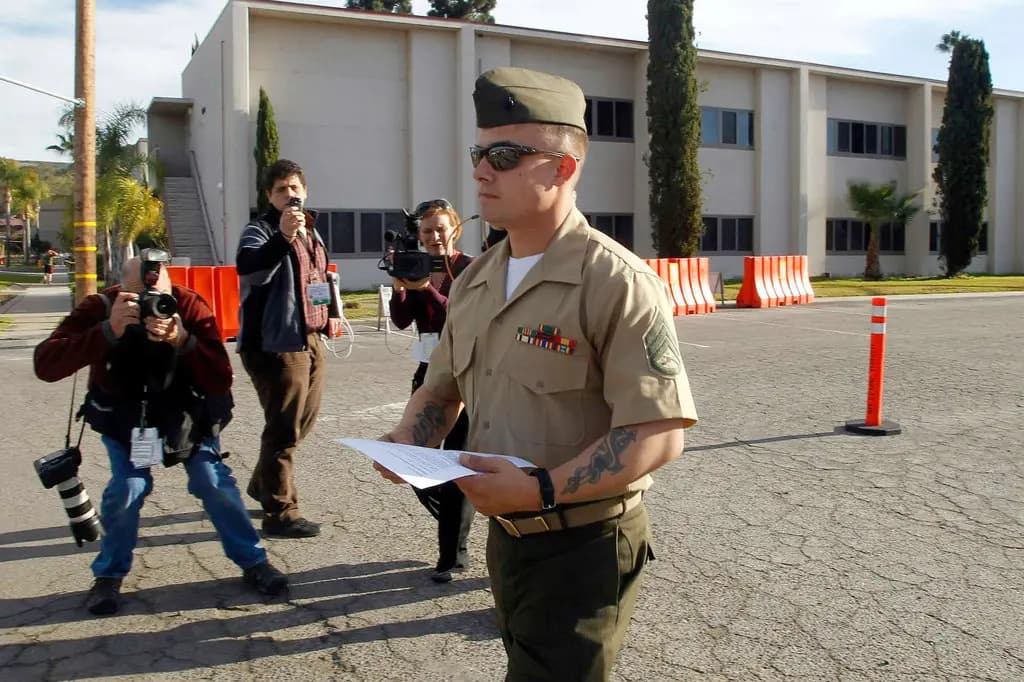We're loading the full news article for you. This includes the article content, images, author information, and related articles.
A BBC investigation implicates two unprosecuted marines in the 2005 killing of an Iraqi family, raising critical questions on accountability for Kenya as the U.S. Senate re-evaluates its strategic military alliance and non-NATO ally status over human rights concerns.

NAIROBI – Twenty years after United States Marines killed 24 unarmed Iraqi civilians in the city of Haditha, a new BBC Eye investigation has unearthed evidence implicating two marines, who were granted immunity and never stood trial, in the killing of nine members of a single family. The findings, detailed in the documentary podcast ‘No Justice, Just Kills’ released on Monday, November 17, 2025, reignite a global debate on the accountability of American forces abroad, a matter of increasing relevance to Kenya as its strategic military partnership with Washington comes under intense scrutiny.
The massacre on Saturday, November 19, 2005 (local time), was a series of retaliatory killings by members of Kilo Company, 3rd Battalion, 1st Marines, after a roadside bomb killed their comrade, Lance Corporal Miguel Terrazas. In a bloody rampage that lasted several hours, the marines killed five men by a taxi and 19 others in nearby homes, including women and children shot at close range. Despite the incident triggering one of the longest war crimes investigations of the Iraq war, no one was ever imprisoned for the killings.
Of the eight marines initially charged, six had their cases dropped, one was acquitted, and only the squad leader, Staff Sergeant Frank Wuterich, was convicted. In a controversial 2012 plea deal, Wuterich pleaded guilty to a single count of negligent dereliction of duty, avoiding jail time and receiving only a rank reduction.
The BBC Eye investigation, drawing on previously unreleased legal documents and a four-year inquiry, focuses on the deaths of the Younes family, where nine people were killed in a back bedroom. Only then-14-year-old Safa Younes survived by pretending to be dead. The report identifies two marines who participated in the house clearings but were never prosecuted: Lance Cpl. Stephen B. Tatum and Lance Cpl. Humberto Manuel Mendoza. Both were granted immunity in exchange for their testimony.
Tatum, who admitted to shooting civilians, had charges of involuntary manslaughter dropped in March 2008. Mendoza, who was not charged, told investigators he shot at least two men because he was following his training that all individuals in a house declared hostile should be shot. The BBC investigation highlights a newly discovered audio recording from Wuterich's trial where Mendoza states he walked approximately 2.4 meters into the bedroom where Safa's family was killed—a detail contradicting earlier suggestions that marines fired only from the doorway in a chaotic response.
This is corroborated by forensic expert Michael Maloney, who was sent to Haditha by the Naval Criminal Investigative Service (NCIS) in 2006. Maloney told the BBC that his analysis of crime scene photos led him to conclude that two marines, not one, had entered the room and shot the women and children from different positions. This forensic assessment challenges the long-held narrative of a single shooter acting in a confused, high-threat environment and suggests a more deliberate series of actions.
The failure to secure meaningful convictions in the Haditha case has long stood as a stark example of the challenges in holding U.S. military personnel accountable for actions abroad. This issue carries significant weight for Kenya, a key security partner for the United States in East Africa. The two nations have a deep and long-standing defence cooperation agreement, signed in 2023 for a five-year period, covering counter-terrorism, joint training, and military technology sharing.
However, this relationship is facing a critical test. In August 2025, the U.S. Senate initiated a formal review of Kenya's status as a Major Non-NATO Ally (MNNA), a designation it received in June 2024. The reassessment, prompted by an amendment to the National Defense Authorization Act, cites concerns over Kenya's growing ties with China and Russia, but critically, also demands scrutiny of its human rights record. The Senate amendment explicitly calls for an assessment of the Kenyan government's potential misuse of U.S. security and intelligence assistance in alleged civilian abductions, torture, and other human rights violations.
The persistent questions surrounding the Haditha investigation underscore the potential for a gap between the principles of justice and the operational realities of foreign military presence. For Kenya, which hosts U.S. forces at bases like Manda Bay and engages in extensive joint operations, the Haditha case serves as a critical case study. It highlights the importance of robust legal frameworks and transparent accountability mechanisms to address any alleged misconduct by visiting forces—a topic of domestic debate in Kenya, particularly concerning the conduct of British troops. The outcome of the U.S. Senate's review could have profound implications for the future of the U.S.-Kenya security partnership, potentially impacting everything from military aid to intelligence cooperation. As the revelations from Haditha demonstrate, questions of justice and accountability are inseparable from the strategic interests that bind international allies.
Keep the conversation in one place—threads here stay linked to the story and in the forums.
Sign in to start a discussion
Start a conversation about this story and keep it linked here.
Other hot threads
E-sports and Gaming Community in Kenya
Active 9 months ago
The Role of Technology in Modern Agriculture (AgriTech)
Active 9 months ago
Popular Recreational Activities Across Counties
Active 9 months ago
Investing in Youth Sports Development Programs
Active 9 months ago